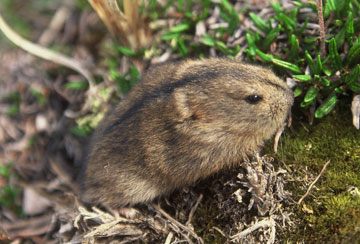Lemmings, the rodents inaccurately believed to commit mass suicide by jumping off cliffs, are at real risk from climate change, reports the Wildlife Conservation Society (WCS). The Bronx Zoo-based group has just announced plans to study the impact of global warming on these creatures of the far North.
“We need to know how climate change will affect a variety of resident and migratory predators that rely in large part on these small arctic rodents,” said Dr. Don Reid, a researcher at WCS Canada. “The ability of lemmings to adapt to these changes will have a significant impact on the entire food web, so we need to understand more about lemming ecology within the context of climate change.”

Collared lemming. Don Reid/Wildlife Conservation Society Contrary to popular belief, lemmings do not commit mass suicide when they migrate. The myth was was propagated by The Walt Disney Company documentary White Wilderness which staged scenes showing the animals leaping from cliffs. |
WCS says that lemmings play a key role in the near-Arctic ecology, serving as “an important prey species for a number of predators, including arctic foxes, red foxes, rough-legged hawks, peregrine falcons, snowy and short-eared owls, jaegers, gulls, weasels, wolverines, and grizzly bears,” populations of which shift due to lemming abundance. WCS reports that snow is likely “one of the key ingredients for lemming abundance and productivity.”
“Sufficient snow depth insulates the rodents from frigid temperatures, allowing them to devote more energy to breeding and less to avoiding predators,” writes John Delaney of WCS. “Later arrival of autumn snows, and earlier spring melts, could subject lemmings to longer periods of sub-freezing temperatures. Also, the tundra is experiencing unusual warm periods in winter, including freezing rain and episodes of thawing and freezing, which can coat much of the lemmings’ foods (sedges and dwarf shrubs) in ice.”
Shifts in climate will force both lemmings and their predators to adjust, possibly causing changes in the abundance of near-Arctic species. WCS plans to track these changes as part of the Arctic Wildlife Observatories Linking Vulnerable Ecosystems (ArcticWOLVES) project, based at Laval University in Quebec.